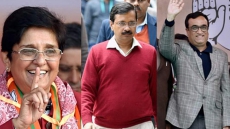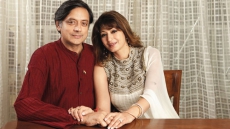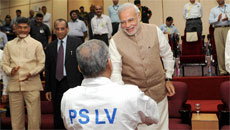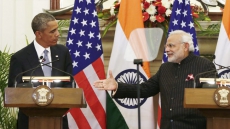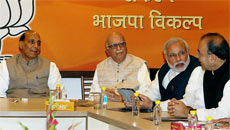The Supreme Court on Tuesday quashed the much-denounced Section 66A of the Information Technology Act after finding it violative of the freedom of speech guaranteed by the Constitution, triggering a frenzy of laudatory posts in the social media within minutes of the far-reaching judgment.
The apex court also read down, or found meaningless, Section 79(3)b of the act, which seeks to assign liabilities on "intermediaries" like Twitter and Facebook, for failing to remove expeditiously, while preserving the evidence of, what is considered objectionable material by the government and its agencies.
Even the Congress party, under the regime of which Section 66A was added in 2008, and the Bharatiya Janata Party, which heads the present coalition government that had defended this section during the court proceedings, welcomed the verdict, unmindful of their stated positions.
The verdict, which was awaited eagerly, especially by avid users of social media, was also an opportunity for them to recollect some past cases where people were actually taken into custody using this section -- which had evoked strong condemnation for giving credence to what they considered was misuse and abuse of law.
"Section 66A of the IT Act is struck down in its entirety," said the apex court bench of Justice J. Chelameswar and Justice Rohinton Fali Nariman, adding that there was no nexus between public order and discussion -- or of dissemination of information causing any annoyance.
"Curbs under Section 66A of the IT Act infringes on public right to know," the court said. "Our Constitution provides for liberty of thought, expression and belief. In a democracy, these values have to be provided within the constitutional scheme. This law is vague in its entirety."
Freedom of speech and expression is guaranteed under Article 19(1)a of the Constitution.
The people's ire was mainly because Section 66A sought imprisonment for up to three years for a person who posts information on the Web world that is found to be "grossly offensive" or has a "menacing character". It also applied where an information, known to be false, is posted for causing "annoyance, danger, obstruction or insult".
The court found no basis for arguments put forth by the government, in favour of 66A, that there was no check and balance in the internet world, unlike the "institutional framework like pre-censorship that exists in print media, television and films".
Those at the receiving end heaved a sigh of relief, like Shajan Skariah of Kottayam, editor of an online portal against whom 22 cases were registered, or Ravi Srinivasan of Puducherry who was arrested in 2012 based on a complaint by Karti Chidambaram, son of P. Chidambaram, former finance minister in the Congress government. "Technically I am a free man now. I am very happy," said Srinivasan who is also an Aam Aadmi Party leader.
Similarly, a professor of Jadavpur University, Ambikesh Mahapatra, was arrested under this section in 2012 for e-mails mocking West Bengal Chief Minister Mamata Banerjee. "This will remove the fear psychosis that has been developing among a large section of internet users that they may get arrested for even innocuous of acts," Mahapatra told IANS.
The apex court, in fact, was moved in 2012 by petitioner Shreya Singhal, an astrophysicist who comes from a family of lawyers, after the arrest of two young women Shaheen Dhada and Renu Srinivasan for posting comments critical of the Mumbai shutdown after the death of Shiv Sena leader Bal Thackeray.
The National Human Rights Commission had also found the duo's detention violative of the freedom of expression. It termed the detention of the two women illegal and had even asked the state to pay them a compensation of Rs.50,000 each.
"I'm ecstatic. It was grossly offensive to our rights, our freedom of speech and expression and today the Supreme Court has upheld that," Singhal said. "Nobody should have any fear of putting up something because of the fear going to prison."
The hearings also saw non-profit organisations like Common Cause and the People's Union for Civil Liberty besides individuals such as self-exiled Bangladeshi writer Taslima Nasreen joining the challenge. An earlier bench of Justice J. Chelameswar and Justice S.A. Bobde couldn't deliver a decision.
The social media found the Congress party's reaction curious, since the entire law was drafted when it was in power. "Section 66A gave too much power in the hands of law enforcement agencies. It's a welcome decision," party spokesperson Manish Tewari said.
The reaction from the government was no different. "We welcome the decision. The government is committed to free speech. India is a democratic country. Free flow of ideas should be respected. We don't seek to curtail any right," IT Minister Ravi Shankar Prasad said.
A former spokesperson for the Bharatiya Janata Party and a lawyer himself, Prasad said it was, nevertheless, important for self-regulation in expressing thoughts in social media, even as the stakeholders claimed victory for the 302 million internet users in India.
In fact, a statement from Prasad's ministry said: "When the UPA Govt came out with the draconian provisions under 66A, BJP in opposition firmly opposed it and said '66A is unacceptable in current form’."
But the government clearly, did not want to remove the section in the counter-affidavit it had filed with the court. The ministry statement said the affidavit wanted to point out the "necessity and desirability of the provisions" while assuring that the government did not wish to curtail the use of cyber space by social media or otherwise.
Other political parties, notably those in the Left Front and the Aam Aadmi Party also said the verdict was welcome while stakeholders other than individuals -- who were particularly concerned over Section 79(3)b -- felt relieved.
"The landmark judgment strengthens the safe harbour provisions for intermediaries Section 79 of the Information Technology Act," said Subho Ray, president of the Internet and Mobile Association of India that counts Google, Facebook and Twitter among its 135 members.
"It is specially helpful to smaller companies who will now not be harassed by the frivolous and mal-intentioned notices of the take down."
